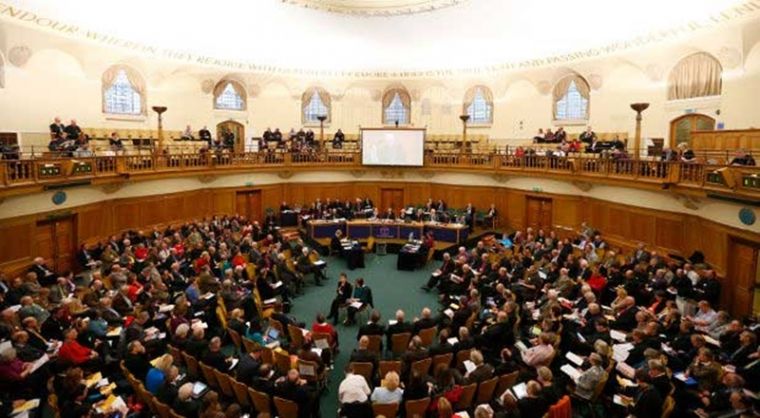Is the Church playing 'catch up' on the climate crisis?

The news that the Church of England's General Synod has set new targets for all parts of the church to work to become carbon 'net zero' by 2030 has been welcomed by many Christians concerned about the environment.
The motion followed the launch of the CofE's first Green Lent (#LiveLent) campaign featuring "40 days of prayers and actions to encourage care for God's Creation."
But given that both Friends of the Earth and Greenpeace were founded nearly 50 years ago, is the Church – and many Christians – now playing 'catch up' on an issue that environmentalists have been highlighting for half a century?
Responding to the Synod motion – that rejected a less ambitious target of 2045 – the CofE's lead bishop on the environment, Bishop of Salisbury, Nicholas Holtam, described the new target as "a game changer," admitting "I don't know how we are going to do it, but that is what we have agreed."
How far and how fast the target is achieved will depend largely on the hard work and commitment of the army of volunteers who work at the grassroots in 13,000 parishes across the country.
Together with local clergy, they maintain around 16,000 church buildings, with more than 12,000 of them listed as being of historic and architectural importance. Often small congregations are working valiantly to keep a church open as a place of worship and a focal point for their community.
So campaigns like the CofE's innovative #LiveLent project will play an important role in influencing 'hearts and minds' and helping Christians see the urgency of the 'climate emergency' – when for many years secular green activists have led the charge.
This Lent, the Church is challenging Christians to follow a set of daily reflections. Questions and topics include 'How much water goes into making a pair of Jeans?' 'Could you twin your toilet?' 'When was the last time you gazed at the night sky?' and 'What was the carbon footprint of the meal I just ate?'
Launching the resources at Lambeth Palace, Archbishop of Canterbury Justin Welby said: "We urgently need to rebuild our relationship with our planet. To do this, we need to change our habits – in how we pray and how we act."
The #LiveLent 2020 project is based on the Archbishop's Lent Book, 'Saying Yes to Life' (published by SPCK), written by Dr Ruth Valerio, global advocacy and influencing director at Tearfund, the Christian relief and development agency.
Writing in The Times this week she says, "I have been speaking and writing about the terrible consequences of the changing climate for more than 20 years. I looked back at some old notes recently and realised that all the things that I was talking about as predictions have become awful realities."
Getting the environment on to the Church's agenda has not been easy. In some parts of the world, it remains a major challenge.
Although some Christian environmentalists have been active since the 1970s and discussions were being held in some church circles, a key breakthrough did not come until 1990, when the worldwide Anglican Communion added a fifth 'mark of mission' of the Church: "To strive to safeguard the integrity of creation, and sustain and renew the life of the earth."
Leading evangelical John Stott was highlighting the environmental challenge at a time when many others failed to grasp its importance. Christian environmental charity Aroche was founded in 1983 when, their website recalls, "Very few Christians seemed to think that the growing environmental crisis had anything to do with them – and very few environmentalists expected better of Christians."
In the decades since, there has been steady progress across some church denominations, but environmentalists agree there is much more that could be done.
As we enter Lent, Ruth Valerio is in no doubt about the potential if Christians and other people of faith respond urgently to the global challenge.
She writes: "Faith is a powerful motivator. In relation to my own faith, Christians are the largest group on the planet and think what a difference could be made if this worldwide network lived differently and used its positions in governments, businesses and society to work for change.
"The call to look after the world — and the people and other creatures that share it — is a foundational part of the Christian scriptures, from the basic affirmation that God created the world and deems it very good and worth looking after (Genesis1:31), through to the recognition that the wider natural world forms part of the story of salvation all the way through to the end."
Back in 2005, the Church of England published a seminal report that highlighted 'a Christian vision for a sustainable future' and saw care for the planet as an issue of justice with the poorest people often most at the mercy of the impact of global warming.
In a foreword welcoming 'Sharing God's Planet,' the then Archbishop of Canterbury Rowan Williams called on Christians to develop "simple accessible ways of learning again what it is to be part of the created order."
His advice? "Receive the world that God has given. Go for a walk. Get wet. Dig the earth."
Maybe it's only when we reconnect in a deeper way with the creation around us that each of us understands more about our part in stewarding the world that God has created. And to do so as part of our Christian calling.
For some Christians that may mean catching up with what many people outside the Church have been saying loudly for decades.
More information on the Church of England's #LiveLent campaign: https://www.churchofengland.org/livelent. Rev Peter Crumpler is a Church of England priest in St Albans, Herts and a former communications director for the CofE.











